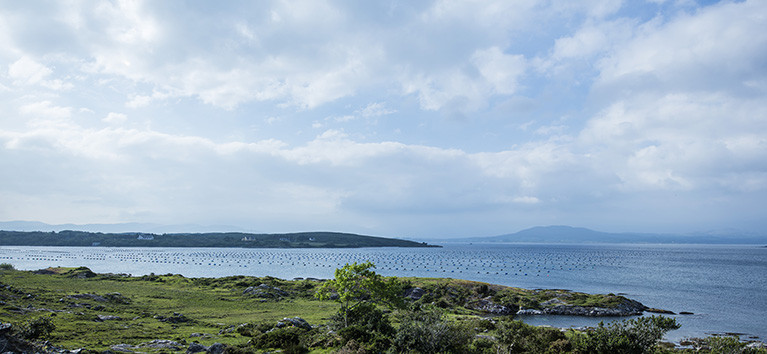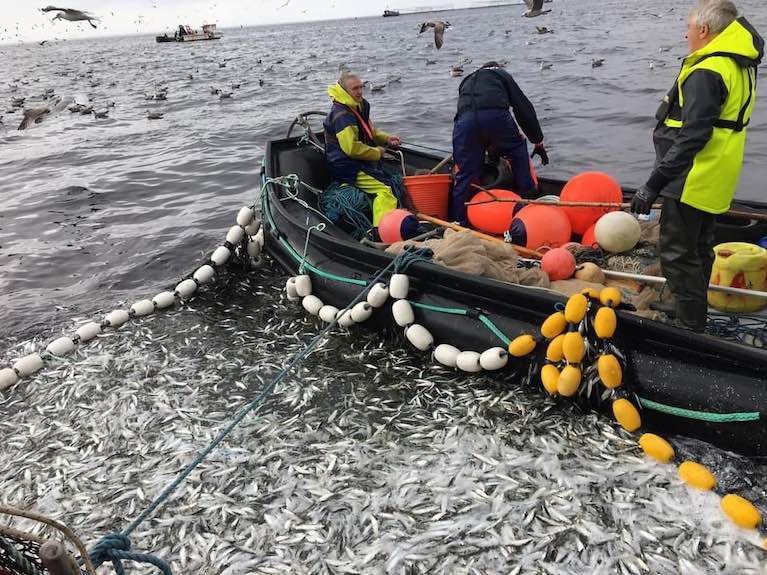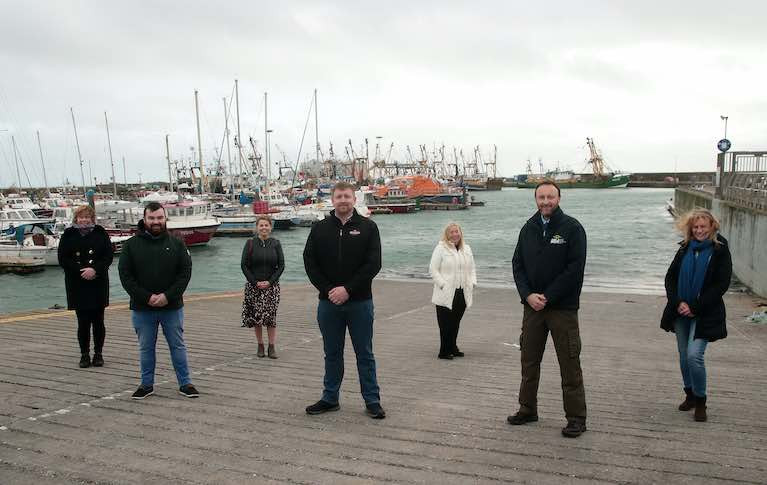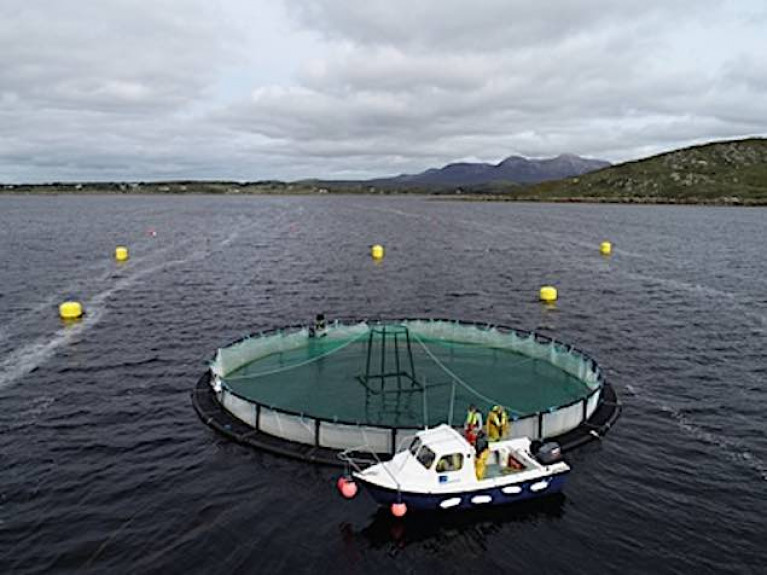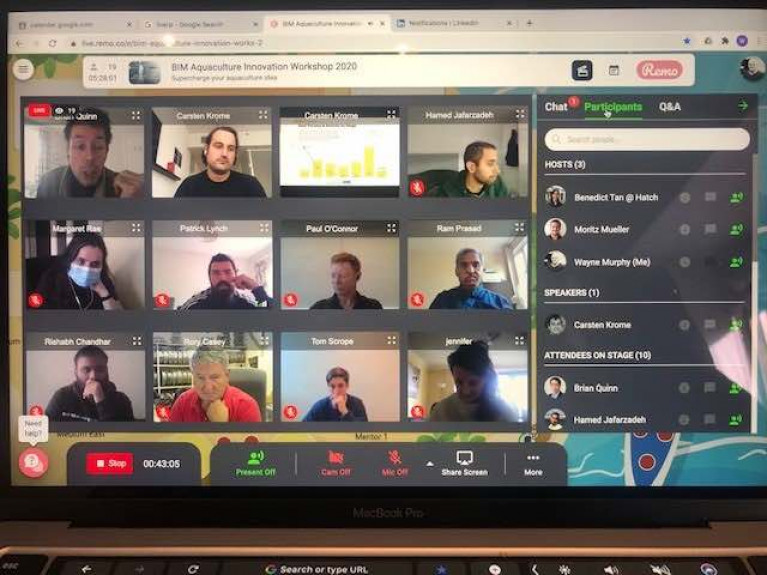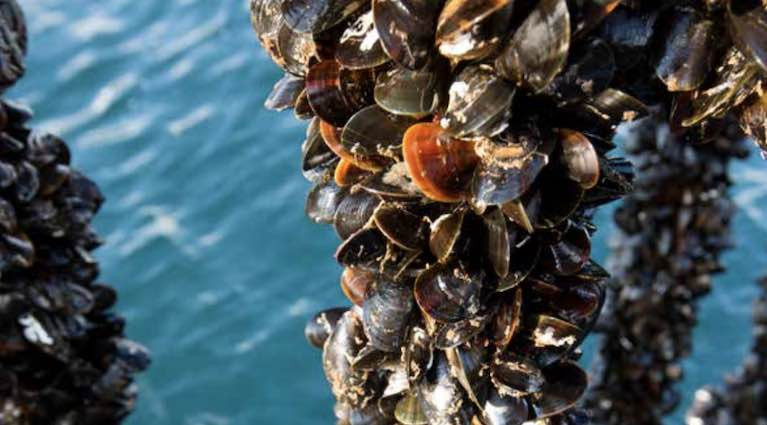Displaying items by tag: aquaculture
Swansea University in collaboration with the Waterford Institute of Technology has announced the line-up of speakers for its webinar entitled Application of Sensors in Precision Aquaculture. The webinar will take place on the 25th of May 2021 and is free to all attendees.
Ten speakers will present a range of cutting-edge sensors being developed in Wales and Ireland to support the aquaculture industry. The webinar will feature talks from entrepreneurs, academics, and government agencies committed to supporting aquaculture companies in decision-making to help make ecological aquaculture an achievable target.
The webinar promises to be an unmissable opportunity for professionals working in the aquaculture of fish, shellfish and seaweeds, but also across this dynamic sector.
"We encourage everyone interested in aquaculture – farmers, researchers, consultants, suppliers, and environmental interest groups to attend this exciting webinar", said Dr Sara Barrento, Swansea University, speaker and organiser of the webinar.
This is the first joint webinar in a series of webinars organized and supported by the European projects: Access2Sea and STREAM.
Access2Sea
Access2Sea aims to facilitate aquaculture expansion in the Atlantic zone by enabling new aquaculture business opportunities for a more competitive and sustainable blue growth. Access2Sea is funded by the Interreg Atlantic Area Programme through the European Regional Development Fund. The project runs from March 2019 to February 2022. Website link here
STREAM
STREAM: Sensor Technologies for Remote Environmental Aquatic Monitoring, aims to develop sensors to collect environmental data and accelerate the dissemination of information. Quick, reliable, and accurate data is essential to inform decision making. STREAM is funded by the European Regional Development Fund through the Ireland Wales Cooperation programme. Website link here
Aquaculture Web Portal Provides Shellfish Industry with Forecasts of Harmful Algal Blooms
As lead partners in a three year Interreg funded project Predicting the Impact of Regional Scale events on the Aquaculture Sector (PRIMROSE), the Marine Institute has developed a web portal that helps predict the risk and impact of harmful algal bloom events (HABS), providing an important tool for Europe's aquaculture industry.
A project meeting recently hosted by the Marine Institute was attended by the 10 partners from Ireland, United Kingdom, Portugal and Spain. The project is due to be completed in July 2021 and has successfully delivered considerable developments in the area of bloom forecasting.
Harmful Algal Blooms (HABs) occur when certain species of microscopic algae grow in response to favourable environmental conditions and result in a variety of harmful impacts. Some can produce biotoxins that can be passed on via filter-feeding shellfish, making them unfit for human consumption. Commercial shellfish production is tested year round to ensure their quality before harvesting, but these blooms can occasionally cause substantial damage to the aquaculture industry through prolonged site closures and loss of produce.
While scientists are aware of the many factors that contribute to HABs, how these factors come together to create a "bloom" of algae is not well understood. HABs occur naturally, but human activities that disturb ecosystems seem to play a role in their more frequent occurrence and intensity. Increased nutrient loadings and pollution, food web alterations, introduced species, water flow modifications and climate change all play a role.
The web portal developed as part of the PRIMROSE project, provides early warning for HABS events along the Atlantic coast. The forecast system provides shellfish producers and official authorities with advance warning that allow them to take rapid mitigating measures to affected shellfish beds and, if necessary, post warnings in coastal areas where there is a direct health risk.
"We cannot prevent Harmful Algal Blooms, but we can be better prepared," said Joe Silke, Director of Marine Environment and Food Safety Services at the Marine Institute. "Having the ability to forecast when such events might happen is a very valuable tool for the shellfish industry, helping to safeguard the product and minimise farming mortalities."
The aquaculture sector in Europe produced and sold 1.4 million tonnes of seafood with a value of nearly €5 billion in 2018. The economic impact of HABs has been estimated at €919 million per year in the EU. The new PRIMROSE web portal will add value to monitoring programmes already in place by re-using valuable data that is already being generated to develop regional HABs forecasts and predictions.
The Marine Institute works closely with authorities and the shellfish industry to monitor shellfish production areas to ensure that Irish shellfish are produced to the highest standards. The Marine Institute also issues weekly HABs Bulletins with information on the potential development of toxic and harmful phytoplankton. Part of the PRIMROSE project has involved gathering feedback on shellfish industry requirements, to improve these weekly HABs bulletin.
The Interreg funded project PRIMROSE includes a consortium of 10 partners from five countries across the European Atlantic area with expertise in areas such as marine ecosystems, aquaculture husbandry, geographic information systems, commercial farming, environmental monitoring, modelling, oceanography, dissemination risk assessment and training.
For more information on the PRIMROSE project visit here
The Minister for Agriculture, Food and the Marine, Charlie McConalogue T.D., today announced the award of €1,811,461 in grants to 28 aquaculture companies under his Department’s European Maritime and Fisheries Fund Programme. The grant awards will support the total investment of €4.5 million in the aquaculture sector. The grants are co-funded by the Government of Ireland and the European Union and are subject to terms and conditions.
Minister McConalogue said, “I am delighted to be in a position today to provide €1.8 million in grants to 28 ambitious aquaculture companies to further the growth of their businesses and our aquaculture sector. These grants will support €4.5 million in investment in oyster, mussels, trout and seaweed farming. Despite two major challenges in the form of Covid and Brexit, these 28 aquaculture businesses are showing confidence in the future of their sector and are expanding their production to meet strong market demand for their quality products.”
 Minister for Agriculture, Food and the Marine, Charlie McConalogue
Minister for Agriculture, Food and the Marine, Charlie McConalogue
Minister added, “In recent years my Department invested in eliminating the licensing backlog for shellfish aquaculture producers and this is I believe being reflected in the large number of grant applications being submitted by shellfish aquaculture producers, showing renewed confidence in their capacity to expand with regulatory certainty.”
Grant approvals - Sustainable Aquaculture Grant Scheme
|
Beneficiary |
Location |
Project |
Total Investment |
EMFF Grant |
|
Dúlra Iorras Teoranta |
Mayo |
Capacity building in a new seaweed production farm and purchase of equipment |
€88,202 |
€44,101 |
|
Mannin Seafoods Ltd
|
Cork |
Mussel Organic Certification |
€1500 |
€750 |
|
Mulroy Bay Mussels Ltd |
Donegal |
Mussel Organic Certification. |
€1000 |
€500 |
|
B.C. Shellfish Ltd |
Kerry |
Capacity building and increasing production on your oyster farm |
€608,007.00 |
€243,203 |
|
Donegal Aquaculture Services Ltd |
Donegal |
Construction of Oyster packing facility |
€290,000 |
€116,000 |
|
Cooley Oysters Ltd |
Louth |
Capacity building and expanding of your oyster farm |
€330,115 |
€132,046 |
|
Crocknagee Oysters Ltd |
Donegal |
Construction of oyster handling facility and purchase of equipment including tractors. |
€670,899 |
€268,360 |
|
Fitzpatrick Oysters Ltd |
Wexford |
Phase 2: Purchase of Farm Equipment |
€78,000 |
€31,200 |
|
Goatsbridge Trout Farm Ltd |
Kilkenny |
Upgrade of Production Facilities |
€1,250,000 |
€500,000 |
|
Inish Sal Teoranta |
Donegal |
Purchase of trestles, hooks, bags and other equipment to further establish the existing business. |
€21,158 |
€8,463 |
|
Irish Oysters Harvest Ltd |
Donegal |
Capacity building and expanding of an oyster farm |
€100,200 |
€40,080 |
|
Dingle Bay Shellfish Ltd |
Kerry |
Purchase of a new flat bottom oyster barge and grader |
€75,280 |
€30,112.00 |
|
Keenan Oysters Ltd |
Louth |
Increasing the production area of an oyster farm |
€448,656 |
€179,462 |
|
Mr. Liam O’Connor |
Kerry |
Increase capacity of oyster farm |
€18,258 |
€7,303 |
|
Mr. Kevin Kilroy |
Mayo |
Start of New Business & Capacity Building of Oyster Farm |
€33,109 |
€13,243
|
|
Mr. Michael Scannell |
Kerry |
Capacity Increase of Oyster Farm |
€15,128 |
€6,051 |
|
Natura Mussels Ltd |
Donegal |
Enhancement of offshore lines to produce oysters using floating bags. |
€32,197 |
€12,879 |
|
Ocean Run Ltd |
Cork |
Improvement of mooring system and expansion of reusable collector rope |
€22,793 |
€9,117 |
|
Poulnasherry Oysters Ltd |
Clare |
Purchase of Oyster Bagging Machine |
€8,500 |
€3,400 |
|
Saddle Rock Fisheries Ltd |
Donegal |
Purchase of trestles and bags to develop new oyster sites at Saddle Rock Fisheries Ltd. |
€58,730 |
€23,492 |
|
Sofi Shellfish Ltd |
Mayo |
Increase capacity of an Oyster Farm |
€11,990 |
€4,796 |
|
Trabay Ltd |
Donegal |
To increase and secure oyster production |
€38,400 |
€15,360 |
|
Turkhead Enterprises Ltd |
Cork |
Purchase of mussel line moulds, ropes and bags |
€34,075 |
€13,630 |
|
Wild Atlantic Sea Products Ltd |
Cork |
Deployment of seaweed farm |
€20,180 |
€10,090 |
|
Cromane Bay Shellfish |
Kerry |
Purchase of circular grader and oyster barge |
€151,266 |
€60,506 |
|
Sciana Mara Teoranta |
Mayo |
To build capacity and upgrade, to increase efficiency and deal with bigger volumes |
€24,067 |
€9,627 |
|
Oisri Min an Chairn Teoranta |
Donegal |
Capacity building of new oyster sites |
€12,755 |
€6,378 |
|
Dooriel Fisheries Ltd |
Mayo |
Upgrade to Water Oyster Grading Line |
€53,280 |
€ 21,312 |
|
Total: |
|
€4,497,745 |
€1,811,461 |
Ireland’s EMFF Operational Programme 2014-2020 provides €240m in funding to the seafood sector (fisheries, aquaculture and seafood processing) over the period 2014 to 2020. The Programme is co-funded by the Government of Ireland and the European Union.
Two EMFF support schemes are available to the aquaculture sector to help achieve the aims of the Government’s National Strategic Plan for Sustainable Aquaculture Development, published in 2015. The Plan is seeking to sustainably grow production by 45,000 tonnes. The Plan is presently being updated for the 2021-2030 period.
The EMFF Sustainable Aquaculture Scheme supports capital investment by licensed aquaculture enterprises to sustainably grow production and reduce environmental impact of aquaculture, together with costs of organic certification of aquaculture production. The EMFF Knowledge Gateway Scheme promotes and supports innovation, technological development and disease management in the aquaculture sector.
Aquaculture Advances in Marine Institute Researchers Showcase at Burrishoole Research Day
On Thursday 25th February 2021, the Marine Institute will host the Burrishoole Research Day, a virtual symposium showcasing the wide network of researchers connected to the Marine Institute’s Newport Research Facility in Co Mayo.
The symposium will include short talks from 26 researchers representing seven Irish and UK Higher Education Institutions, including the Marine Institute. Researchers will share insights into their research projects and advances in areas such as climate change, fish telemetry, genomics, aquaculture and ecological change.
The Newport Research Facility in Co Mayo has been in operation since 1955, and has been part of the Marine Institute since 1999. Located at the base of the Burrishoole catchment, the facility is located at the interface of the freshwater and marine ecosystems. The combination of the unique location, and long time series of environmental datasets have attracted national and international researchers to the facility for many decades.
Fisheries research at the Newport Research Facility focuses on migration, ecology, genetics, population dynamics and management advice for species including salmon, sea trout, eel, sea bass, blue fin tuna, pollack and stickleback. There are also a range of research projects on the impacts of climate and land use change on aquatic ecosystems, limnology, oceanography and sustainable aquaculture.
Researchers based at the Marine Institute’s Newport Research Facility have secured competitive funding in a number of research areas. As part of the Marine Institute’s Cullen Scholarship Programme, a number of postgraduate students have also been based at the Newport Research Facility to work on projects relevant to the Marine Institute whilst studying for a higher degree. The resulting research network, encompassing researchers from the Marine Institute and Higher Education Institutes, is diverse and collaborative. This symposium will highlight progress on research projects in the last three years, as well as introduce some new projects.
The symposium will include four sessions via Zoom from 10am to 4pm on Thursday 25th February 2021. To access the programme and the Zoom link, email [email protected]
Environmentally Sustainable Practices of Irish Aquaculture Focus of Documentary to Air in December
Environmentally sustainable practices of Irish aquaculture focus of documentary to air in December
The sustainable practices of the Irish aquaculture industry will form the focus of a Euronews documentary being broadcast later this month. Richard Donnelly, Salmon and Shellfish Manager, BIM and John Harrington, Kush Shellfish were interviewed as part of the documentary to tell the story of Irish organic mussels.
Aquaculture production was valued at €172million to the Irish economy last year according to the 2019 BIM Business of Seafood report. Irish organic salmon remained the top value export at €110million while farmed shellfish accounted for €60million of the total value.
Richard Donnelly, BIM said: “When people think of organic, they link it to the feed being organic but don’t factor in other aspects. However, organic speaks to a much broader ecological and ethical mindset. If you take the example of organic mussels being produced in Kenmare, Co Kerry, it’s about working in harmony with nature. The EU organic regulations also take account of wider environmental management practices focusing on aspects such as waste management and energy use to improve overall environmental performance of member businesses.”
Kush Shellfish were among the first rope grown mussel farm in Ireland to produce organic mussels. The family run farm is based in Kenmare Bay in a special area of conservation designated under the European Union Habitats Directive. The business is largely export led weighted toward the continental European markets.
The documentary will air on Euronews on Tuesday the 22nd of December at 20:52 CET and is being translated into nine languages to air across Europe this month.
New EU €6.1 Billion Maritime Fisheries & Aquaculture Fund Welcomed by Marine Minister
The Minister for Agriculture, Food and the Marine Charlie McConalogue T.D. today welcomed a provisional agreement concluded between the European Council and European Parliament on the text of the new European Maritime Fisheries and Aquaculture Fund (EMFAF) which will disperse a €6.108 billion budget over the 2021-27 period to promote the sustainable development of the European Union’s seafood sector. Following final legal and technical scrutiny of the agreed text, the proposal will go to the EU Council and the EU Parliament for endorsement, with enactment expected early in 2021.
Welcoming the deal, Minister McConalogue said, “Following a positive engagement between the Council and Parliament over the past year, I am very pleased to note that a provisional agreement has now been reached on the new EU Fund to replace the EMFF for the next seven years 2021-27. Ireland is set to receive some €142 million of EU funds from the new Fund, to be combined with co-funding from the Government of Ireland, which I will discuss with Minister McGrath. This is very good news for Ireland’s fishermen, fish farmers, processors and coastal communities. The departure of the UK has significantly reduced the overall EU budget, so it is all the more pleasing that we have succeeded in broadly maintaining funding for our seafood sectors at the previous high levels.”
Minister McConalogue added, “My Department has been working hard to put together a new Seafood Development Programme for the 2021-27 period and this development will allow the remaining elements of that Programme to be advanced, in consultation with our stakeholders, with a view to the adoption of the new Programme later in 2021.”
The European Maritime, Fisheries and Aquaculture Fund (EMFAF) for the period 2021-2027 amounts to 6.1 billion EUR (6.108 billion EUR in current prices). Some 5.3 billion EUR will be allocated for the management of fisheries, aquaculture and fishing fleets, while the remaining sum will cover measures such as scientific advice, controls and checks, market intelligence, maritime surveillance and security.
Wexford Campus Aquabusiness Diploma Attracting International Students
Students from Norway and other countries are participating in a higher diploma in aquabusiness which is now in its fourth year in Wexford.
A total of 19 students have registered for the one-year part-time diploma in “business in aquabusiness” which is being run by Carlow Institute of Technology’s (CIT) Wexford campus.
As Afloat reported previously, the course was developed by CIT with Bord Iascaigh Mhara (BIM).
It is the only Fetac level eight course aimed. at the fisheries, marine and aquaculture sector in Ireland.
Numbers have doubled as the course goes from “strength to strength”, according to the college.
Students of last year’s course recently participated in an online graduation ceremony due to Covid-19.
However, some of the fisheries sector graduates gathered in a socially distant manner for a photograph at Kilmore Quay harbour, along with three Wexford campus staff and a local representative of BIM.
The course presents two annual awards in memory of late Donegal fishing industry leader Joey Murrin, and the late BIM chief executive Brendan O’Kelly.
Presentation of these awards to the latest graduates has been deferred until the public health situation improves.
CIT’s Wexford campus says that the three remaining modules for the fourth year of the higher diploma will run online from January 2021.
These modules can be taken separately as certificates.
The law and regulation modules will be covered every second Friday and Saturday from mid-January, while strategic and innovation management will run from late February.
A module in planning will be covered from mid-April.
Interested students for these subjects as certificates can contact course Amy Allen at email address [email protected]
Increasing the value and sustainability of aquaculture will be the focus of ASTRAL, a new EU funded research project, that involves the Marine Institute and partners across the Atlantic.
Ireland’s aquaculture sector produces 38,000 tonnes annually, providing a valuable food product as well as employment in Ireland’s coastal communities. Aquaculture is also central to providing opportunities to increase food security for the world’s growing population. Developing new technologies and processes in aquaculture helps ensure seafood is produced responsibly and sustainably.
The research project ASTRAL (All Atlantic Ocean Sustainable, Profitable and Resilient Aquaculture) aims to increase value and sustainability from integrated multi-trophic aquaculture (IMTA) production by developing new, resilient, and profitable value chains.
IMTA involves farming multiple, complementary species from different levels of the food chain together for their mutual benefit. The waste from one aquatic species are used as food for another species. The fish are fed, the shellfish filter out microscopic plants and organic content from the water and seaweed absorbs the minerals in the water. The natural ability for these species, shellfish and seaweed, to recycle the nutrients or waste that are present in and around fish farms can help improve the environment performance of aquaculture production sites. In addition, the approach also maximises the use of space and the diversity of species provides extra economic benefits.
IMTA will be an integral part of the ASTRAL project and will be investigated at four research sites in Scotland, South Africa, Brazil and the Marine Institute’s marine research site in Lehanagh Pool in Connemara, Co Galway. There will also be a prospective IMTA site in Argentina.
Over the next four years, the Lehanagh Pool research site will use the IMTA process to produce Atlantic salmon, lumpfish, European lobster, king scallop, sea urchin and brown and green species of seaweed. The production of these species together will allow the Marine Institute to test how well each species grows in the IMTA environment and will enable the research team to investigate new production methods.
The Marine Institute will also lead one of the work packages, which involves overseeing the five research sites in the ASTRAL project. The Marine Institute research team along with the other IMTA partners will identify best practice for IMTA, looking at animal welfare, biosecurity and fish health with a view to producing “Species for the Future” catalogue which will help pave the way for resilient, profitable, sustainable aquaculture production in the Atlantic in the future.
Pauline O’Donohoe, ASTRAL Project Coordinator at the Marine Institute said, “As a research organisation, the Marine Institute will assist with developing the techniques and assessing the benefits of IMTA. This collaborative project aims to support the aquaculture industry, by providing aquaculture producers with the tools to diversify their aquaculture species and practices.”
The ASTRAL project has received a budget of close to €8 million under the Horizon 2020 Programme. The ASTRAL consortium includes 16 partners from 10 countries around the Atlantic Ocean and is led by the Norwegian Research Centre (NORCE).
ASTRAL goals include achieving zero-waste aquaculture systems, as well as creating business models and tools to increase profitability. Potential climate risks and emerging pollutants such as microplastics and harmful algae blooms will be assessed, together with the development of innovative technology such as specific sensors and biosensors, with the final aim to provide monitoring recommendations to policymakers.
Sharing knowledge and capacity development are among the ASTRAL priorities, and to build a collaborative ecosystem along the Atlantic Ocean with industrial partners, Small and Medium Enterprises (SMEs), scientists, policymakers, social representatives and other relevant stakeholders.
The ASTRAL project will contribute to the implementation of the Belém Statement, an agreement signed by EU, Brazil and South Africa to develop a strategic partnership on marine research, and it will participate in building an All Atlantic Ocean Community.
Ten start-ups from backgrounds including tech and AI took part in this year’s Bord Iascaigh Mhara (BIM) Aquaculture Workshop. This year’s event, run by Hatch and supported by the European Maritime and Fisheries Fund took place entirely online due to the COVID-19 pandemic. The two-week event had been originally due to take place in the RDIhub in Killorglin, Co Kerry, but was instead live streamed.
Richard Donnelly, BIM Salmon and Shellfish Manager highlighted the breadth of innovation needed to power the aquaculture sector today and said:
“ The aim of these workshops is to continue to position Ireland as a leader in the next phase of aquaculture innovation by helping to speed up the development of promising start-ups. Events such as these are vital to the continued development of Ireland’s aquaculture sector because of the role they play in driving new ideas and innovation.”
Wayne Murphy, COO, Hatch also highlighted the quality of this year’s participants and their range of skills and said:
"We were incredibly pleased with the demand for places on this year’s workshop and with the quality of participants and range of technologies applying. Their appetite for learning and for accessing the tools, knowledge and networks to scale their ideas and technologies has been very encouraging throughout this first phase of the workshop. Sessions with the Hatch team ranged from the global aquaculture landscape industry pain points, venture capital with Aquaspark, strategy and planning, investor readiness and to the protection of IP, making it a busy and productive week. It has been exciting to connect and work with these ambitious entrepreneurs and we look forward to seeing how they develop and grow over the months and years ahead."
Transparency in seafood production and trade, revolutionary energy-saving technology for land-based systems and wastewater expertise are just some of the areas of focus for the 2020 participating businesses.
This year’s workshop ran from Monday 5th until the 16th October 2020.
Covid-19 Aquaculture Financial Support for Rope Mussel & Oyster Farmers
Speaking at the IFA Aquaculture Webinar today Thursday 22 October, the Minister for Agriculture Food and the Marine, Charlie McConalogue T.D., announced a special Covid-19 financial support scheme for rope mussel and oyster farmers under his Department’s European Maritime and Fisheries Fund Programme 2014-20, co-funded by the Government of Ireland and the European Union.
Announcing the new support scheme, Minister McConalogue said, “Rope mussel and oyster farmers were significantly impacted in the first half of 2020 by the market access and price difficulties caused by the Covid-19 Pandemic. While these issues eased as the first wave of the Pandemic passed, the impacts of lost sales and production left a lasting financial burden on these aquaculture enterprises. Rope mussel farmers suffered a 34% fall in sales between February and June, while oyster farmers suffered a sales drop of 59%. The continued viability of these SME enterprises is jeopardised by these unprecedented shocks to their businesses, with many struggling to cover their fixed costs and to fund the cost of purchasing seed to grow their next crops.”
Minister McConalogue added, “I am announcing today a special support scheme for these oyster and rope mussel producers that will provide a fixed, one-off payment of between €6,800 and €16,300 to each eligible oyster farming business and between €1,300 and €9,000 for rope mussel producers. The payments will vary according to three size classes based on records of previous production levels held by BIM. I anticipate that BIM will be inviting applications in early November with a view to paying successful applicants in 2020”.
Rope Mussel & Oyster Farmers Only
The new Covid-19 Aquaculture Support Scheme will be available to rope mussel and oyster farmers only. Eligibility will be confined to those enterprises that had stock on site in 2020. Terms and conditions will include, inter-alia, compliance with aquaculture and foreshore licence conditions, tax clearance certification, and submission of returns to BIM of the Aquaculture Production and Employment Survey in each of the three years 2017-19.
For the purposes of the scheme, producers will be classified according to their previous production levels over the period 2017-19, based on three categories, 0 to 50 tonnes production, 50 to 100 tonnes and greater than 100 tonnes. The table below details the fixed one-off payments that will be offered to successful applicants and the number of enterprises expected to benefit.
|
Rope Mussels |
Oysters |
|||||
|
Historic Production |
0-50 T |
50-100 T |
>100 T |
0-50 T |
50-100 T |
>100 T |
|
No. enterprises |
16 |
10 |
24 |
82 |
26 |
23 |
|
Fixed payment |
€1,300 |
€3,600 |
€9,000 |
€6,800 |
€11,300 |
€16,300 |
Further details of the Scheme will be available from BIM shortly.


























